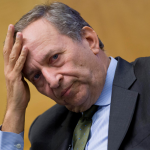Larry Summers: U.S. may just have lost its role as underwriter of the global economic system
 After China made public 57 countries would become founding members of the Asian Infrastructure Investment Bank (AIIB) the Wall Street Journal reported that the US ‘had lobbied hard against Chinese plans for a new infrastructure development bank […] including during teleconferences of the Group of Seven major industrial powers.’
After China made public 57 countries would become founding members of the Asian Infrastructure Investment Bank (AIIB) the Wall Street Journal reported that the US ‘had lobbied hard against Chinese plans for a new infrastructure development bank […] including during teleconferences of the Group of Seven major industrial powers.’
The news that the UK would become one of the founding members of the new Asian Infrastructure Investment Bank (AIIB) shocked many in the US. Larry Summers, who served as a Secretary of the US Treasury between 1999 and 2001, immediately understood the significance of these developments, and delivered this strong message in this column, a few weeks after the news broke:
“This past month may be remembered as the moment the United States lost its role as the underwriter of the global economic system. True, there have been any number of periods of frustration for the U.S. before, and times when American behaviour was hardly multilateralist, such as the 1971 Nixon shock, ending the convertibility of the dollar into gold. But I can think of no event since Bretton Woods comparable to the combination of China’s effort to establish a major new institution and the failure of the US to persuade dozens of its traditional allies, starting with Britain, to stay out of it.”
This announcement Britain would be one of the founding members was highly criticized by the US. The Financial Times quoted an unnamed US official:
Summers was also critical of the US strategy toward the newly founded AIIB:
“The US misjudged the situation tremendously, put pressure on allies and developing countries to under no circumstances be part of AIIB […] Largely because of resistance from the right, the United States stands alone in the world in failing to approve International Monetary Fund governance reforms that Washington itself pushed for in 2009. By supplementing IMF resources, this change would have bolstered confij idence in the global economy. More important, it would come closer to giving countries such as China and India a share of IMF votes commensurate with their increased economic heft.”
With Britain and many more major European countries signing up as founding members of the AIIB, the US economic hegemony has been dealt an enormous blow. For the first time since the end of the World War II, the US is not in the driving seat during the foundation of a highly significant global institution. Of course, this will not change the world economic system overnight, but when we look back in five, ten or even fifteen years’ time, March 2015 may be remembered as a turning point in economic history.

